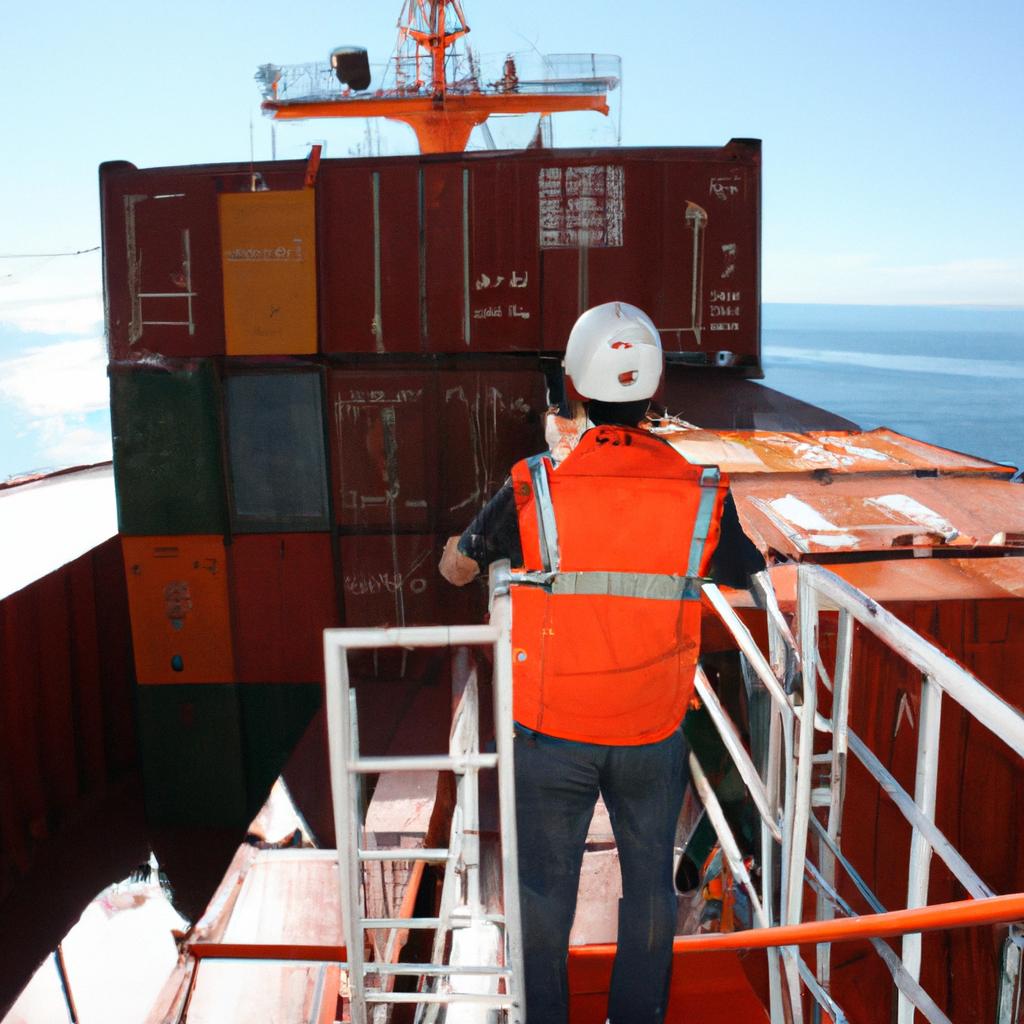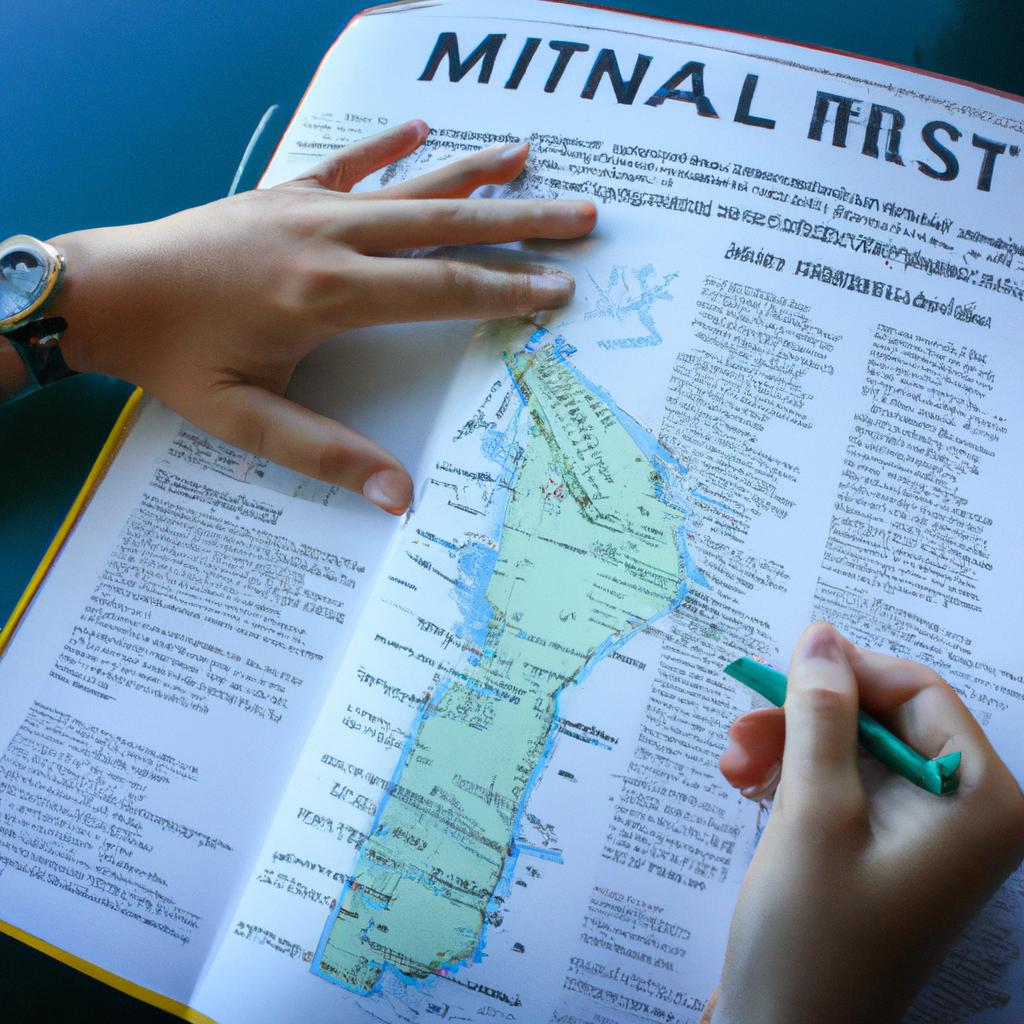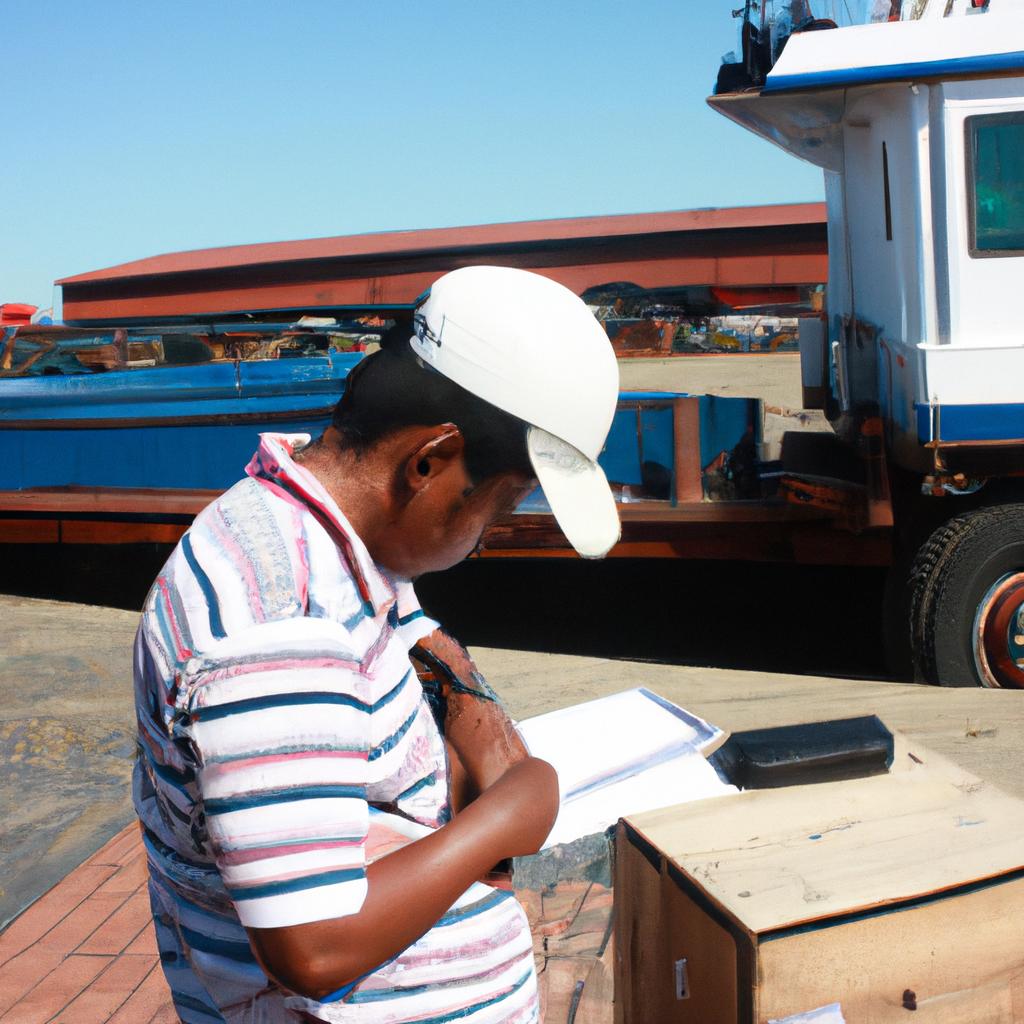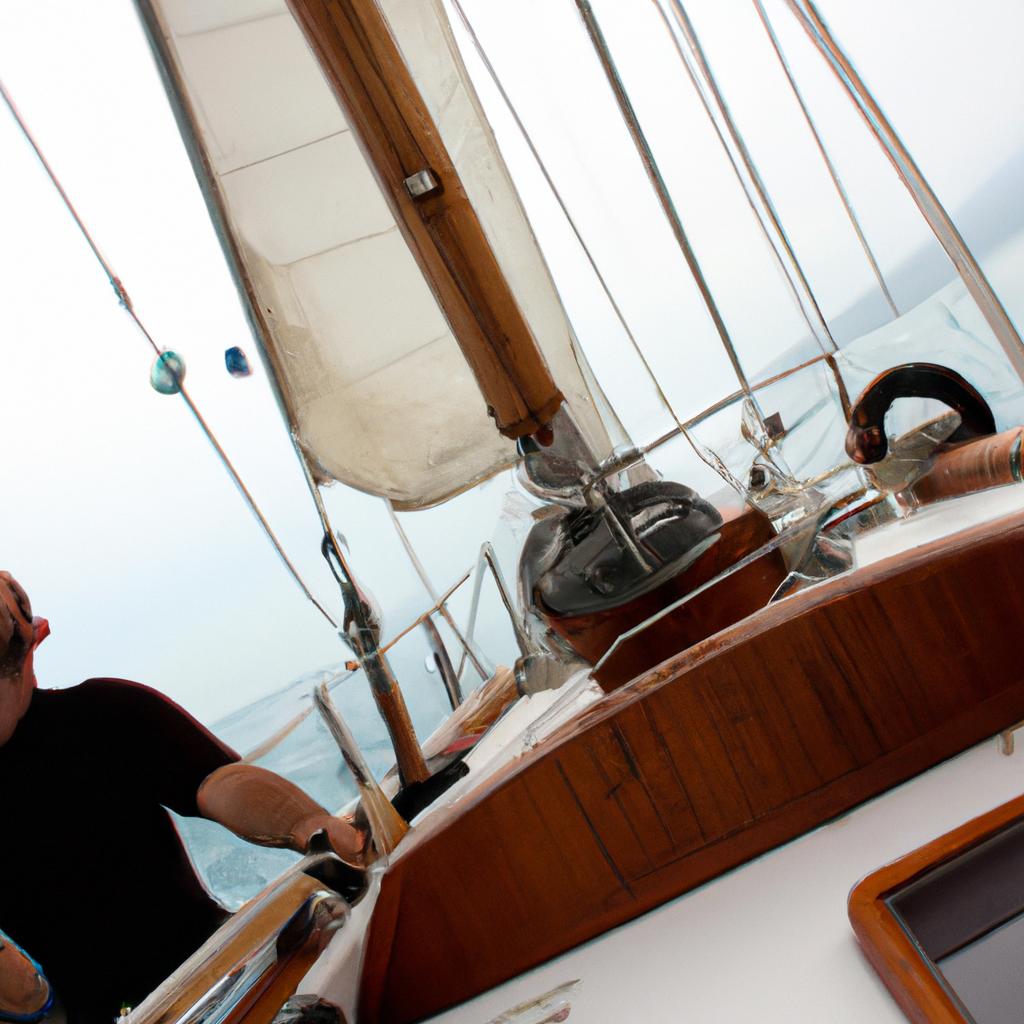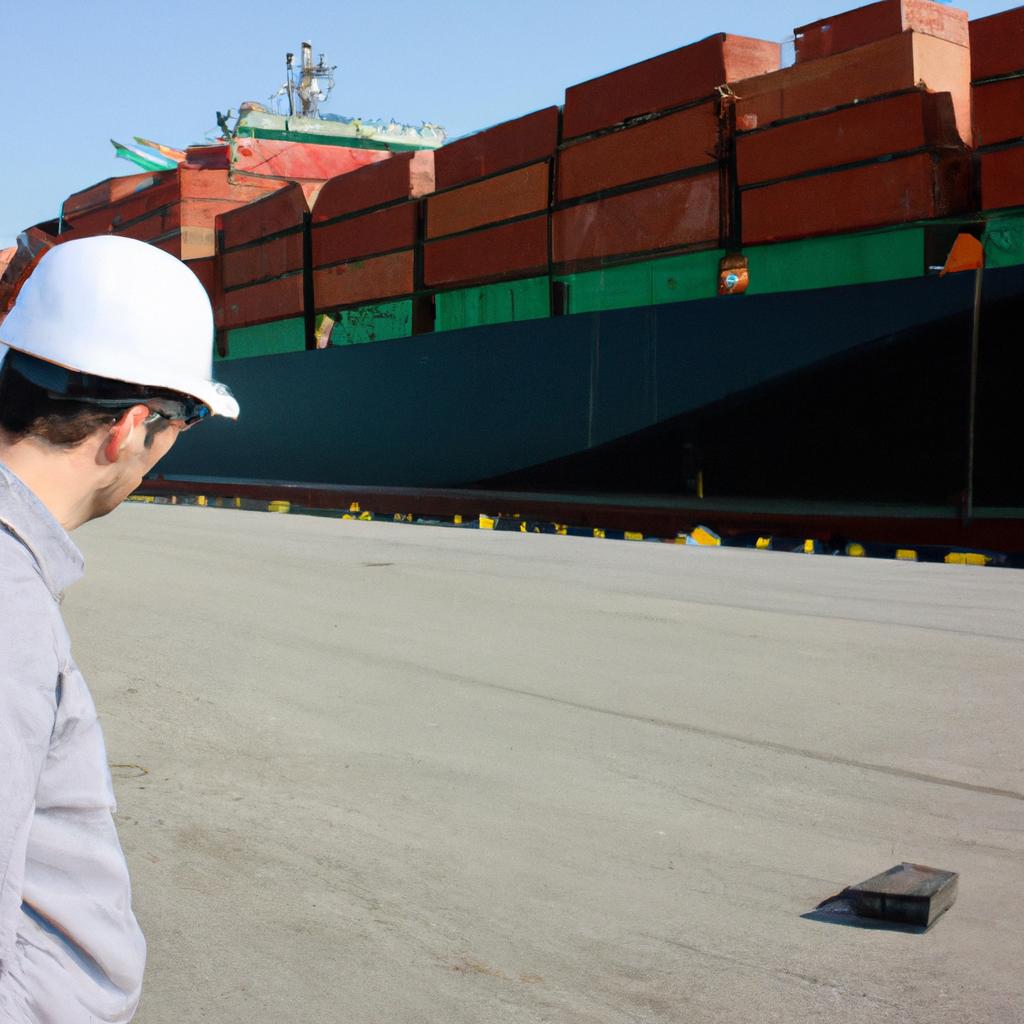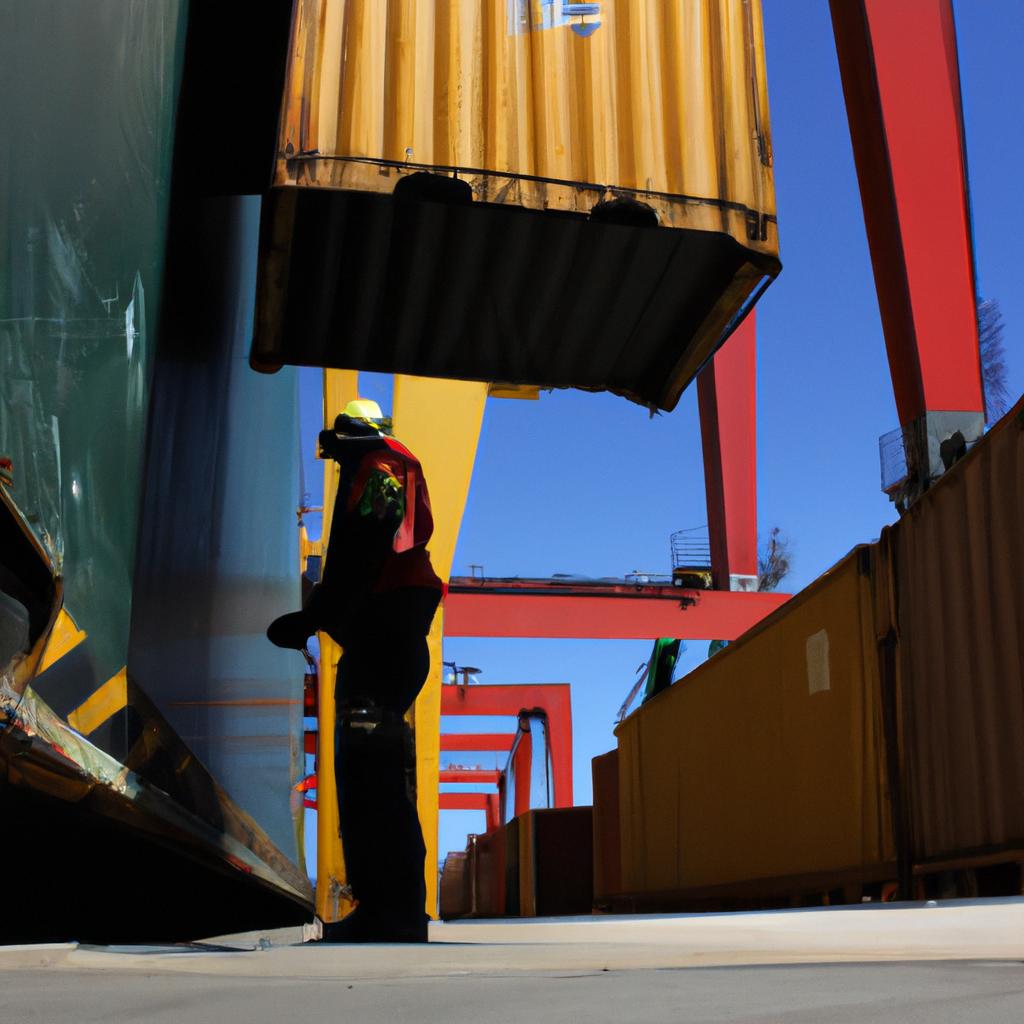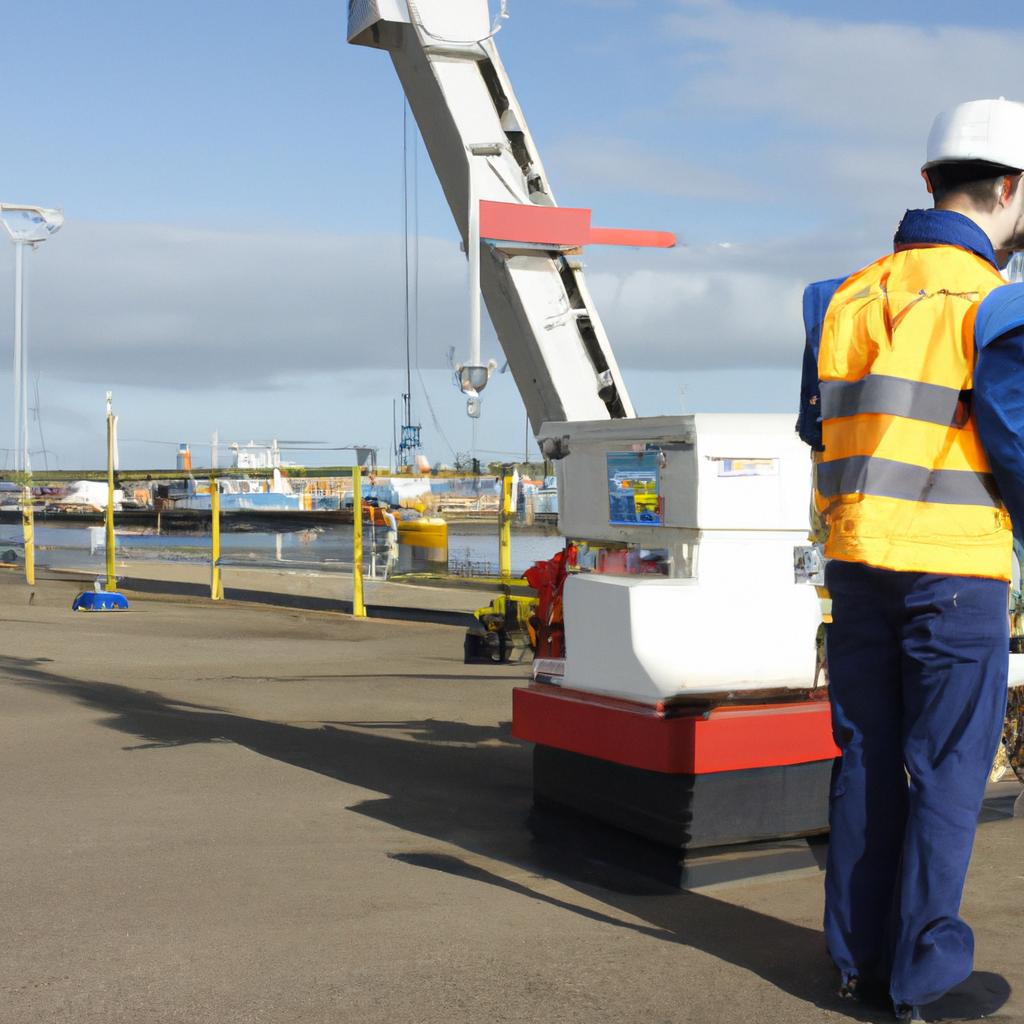The Black Sea region has long been a crucial hub for maritime trade and transportation, connecting Europe, Asia, and the Middle East. As such, it is essential to have effective vessel registration systems in place to ensure compliance with international maritime regulations and maintain safety standards. This article examines the importance of vessel registration in the Black Sea region, explores the current regulatory framework governing this process, and highlights key challenges faced by ship owners and operators.
To illustrate the significance of vessel registration in the Black Sea, consider a hypothetical case study involving a cargo ship transporting goods from Istanbul to Odessa. Without proper registration and adherence to maritime regulations, this ship would be at risk of facing penalties or being detained by port authorities along its route. Vessel registration provides legal recognition and documentation for ships operating within these waters, ensuring their compliance with safety protocols, environmental standards, crew qualifications, and other vital aspects of maritime law. By examining the existing regulations governing vessel registration in the Black Sea region, we can gain insights into how these measures facilitate safe and efficient transport while addressing unique challenges specific to this area’s geopolitical dynamics.
Overview of Vessel Registration Process
To illustrate the importance and complexity of vessel registration in the Black Sea, let us consider a hypothetical scenario. Imagine a shipping company based in Turkey that wishes to expand its operations by acquiring a fleet of cargo vessels for international trade. In order to operate legally and safely within the region, these vessels must undergo a comprehensive registration process governed by the regulations set forth by Black Sea transport authorities.
The vessel registration process consists of several key steps aimed at ensuring compliance with maritime regulations and promoting accountability within the shipping industry. These steps include:
- Initial application: The shipowner or operator submits an application to the relevant regulatory body, providing detailed information about the vessel’s specifications, ownership structure, and intended use. This step establishes the initial contact between the applicant and the regulatory authority.
- Technical inspection: Once the application is received and reviewed, a thorough technical inspection is conducted to assess the vessel’s seaworthiness and adherence to safety standards. This evaluation encompasses various aspects such as hull integrity, navigation equipment, communication systems, firefighting capabilities, and crew qualifications.
- Documentation verification: Simultaneously with the technical inspection, extensive documentation review takes place to ensure all legal requirements are met. This includes verifying certificates of ownership, proof of insurance coverage, crew certifications, compliance with environmental regulations, and any other necessary permits.
- Registration approval: After successful completion of both technical inspections and documentation verification processes, if all criteria are satisfied, the vessel will be officially registered under the flag state jurisdiction where it operates from.
Embracing this procedure has numerous benefits for shipowners seeking to navigate their vessels across Black Sea waters while adhering to established maritime rules. By registering their vessels in accordance with Black Sea transport regulations, companies can enjoy advantages such as enhanced credibility among stakeholders due to reliable compliance records; access to favorable financing options facilitated by banks recognizing registered ships’ security value; improved safety standards enforced through regular inspections; and the ability to participate in international trade, while demonstrating respect for environmental practices.
With a comprehensive understanding of the vessel registration process established, let us now explore the compelling benefits that shipowners can gain from registering their vessels in the Black Sea.
Benefits of Registering Vessels in the Black Sea
Having understood the process involved in vessel registration, let us now explore the significant benefits associated with registering vessels in the Black Sea. To illustrate these advantages, consider a hypothetical case study involving “Company X,” a shipping company that operates a fleet of cargo vessels.
Benefits of Registering Vessels in the Black Sea:
-
Enhanced Market Access and Competitive Edge:
- Registering vessels under the flag of a Black Sea country grants Company X access to an extensive network of regional ports.
- This expanded market reach enables them to establish new trade routes and tap into emerging markets within and beyond the region.
- Furthermore, registered vessels may be eligible for preferential treatment or incentives offered by countries bordering the Black Sea, thus giving Company X a competitive advantage over non-registered counterparts.
-
Favorable Taxation and Fiscal Incentives:
- The Black Sea jurisdictions provide attractive tax regimes specifically designed to incentivize vessel registration.
- Companies like Company X can benefit from reduced corporate taxes, exemptions on certain fees, and customs duty reductions.
- These fiscal incentives contribute to cost savings for shipowners while promoting economic growth within the region.
-
Regulatory Compliance and Security:
- By registering their vessels in compliance with Black Sea transport and maritime regulations, Company X ensures adherence to international standards regarding safety measures, crew certification requirements, pollution prevention protocols, etc.
- Such compliance enhances operational efficiency while mitigating risks related to accidents, legal disputes, and reputational damage.
Emotional Response Bullet Point List:
The decision to register vessels in the Black Sea evokes emotions such as:
- Confidence: Knowing that your ships operate under well-established regulatory frameworks ensures peace of mind and confidence in the reliability of your operations.
- Opportunity: The expanded market access and emerging trade routes present exciting growth opportunities for shipping companies like Company X.
- Financial Security: Taking advantage of favorable taxation schemes can lead to significant cost savings, ultimately bolstering financial stability.
- Responsibility: Prioritizing regulatory compliance highlights a commitment to safety, environmental protection, and ethical business practices.
Emotional Response Table (3 columns x 4 rows)
| Emotion | Description | Example |
|---|---|---|
| Confidence | Feeling secure in the knowledge that vessels comply with regulations. | Company X meets all international maritime requirements. |
| Opportunity | Excited about exploring new markets and trade routes. | Registering ships in the Black Sea opens doors to growth. |
| Financial Security | Assurance of reduced taxes and economic benefits for shipowners. | Significant cost savings are achieved through registration. |
| Responsibility | Demonstrating a commitment to safety, environment, and ethics. | Compliance promotes responsible business operations. |
In conclusion, registering vessels in the Black Sea offers numerous advantages such as enhanced market access, fiscal incentives, regulatory compliance, and increased security measures. These benefits provide shipping companies like Company X with improved competitiveness while fostering confidence, seizing new opportunities, ensuring financial stability, and displaying responsibility towards industry standards.
Transition into subsequent section on “Key Requirements for Vessel Registration”:
With an understanding of the benefits associated with vessel registration in the Black Sea established, let us now delve into the key requirements necessary for successful registration without any interruption or delay in operations.
Key Requirements for Vessel Registration
Section H2: Key Requirements for Vessel Registration
The decision to register a vessel in the Black Sea comes with certain requirements that must be met by shipowners and operators. By fulfilling these key requirements, owners can ensure compliance with maritime regulations and enjoy the benefits associated with registering their vessels in this region.
One example of a requirement is the need for proper documentation. Shipowners are required to provide detailed information about their vessels, including proof of ownership, technical specifications, and safety equipment on board. This documentation serves as crucial evidence of compliance with international standards and helps authorities monitor the condition and capabilities of each registered vessel.
In addition to documentation, there are several other key requirements shipowners must adhere to when registering their vessels in the Black Sea:
- Compliance with safety standards: Vessels must undergo regular inspections to ensure compliance with safety regulations set forth by international organizations such as the International Maritime Organization (IMO). These inspections cover various aspects, including fire prevention measures, navigation equipment, life-saving appliances, and pollution prevention systems.
- Certification from recognized classification societies: To further demonstrate adherence to international standards, vessels must obtain certification from reputable classification societies. These societies assess ships’ structural integrity, machinery performance, and overall seaworthiness.
- Payment of registration fees: Registering a vessel involves paying specified fees according to its size and type. These fees contribute towards maintaining effective governance within the maritime industry and funding necessary services provided by regulatory bodies.
- Compliance with environmental regulations: Strict environmental regulations govern shipping activities in the Black Sea region. Vessel owners must comply with rules regarding ballast water management, air emissions control, waste disposal, and protection of marine ecosystems.
To better understand these key requirements at a glance:
| Requirement | Importance | Benefits |
|---|---|---|
| Proper Documentation | Ensures legal compliance | Accurate record keeping |
| Compliance with Safety Standards | Ensures vessel and crew safety | Reduces the risk of accidents |
| Certification from Classification Societies | Demonstrates adherence to international standards | Enhances reputation and marketability |
| Payment of Registration Fees | Supports effective governance in maritime industry | Funds necessary services provided by regulatory bodies |
By fulfilling these requirements, shipowners can ensure that their vessels are registered in accordance with Black Sea transport and maritime regulations. This not only guarantees compliance but also provides numerous benefits, including improved safety, enhanced reputation, and access to a well-regulated marketplace.
Understanding the key requirements for vessel registration is just one step towards ensuring compliance with international standards. In the following section, we will delve into the importance of ongoing monitoring and enforcement measures to maintain a robust maritime environment.
Ensuring Compliance with International Standards
In the previous section, we explored the key requirements for vessel registration. To further illustrate these requirements and their implications, let us consider a hypothetical case study of a shipping company operating in the Black Sea region.
Case Study: XYZ Shipping Company operates a fleet of commercial vessels that transport goods across various ports in the Black Sea. In order to comply with maritime regulations, they ensure that each vessel meets the necessary requirements for registration. These requirements include:
-
Ownership Documentation: The company provides proof of ownership or control over the vessel, typically achieved through registered title deeds or charter agreements.
-
Safety Standards Compliance: XYZ Shipping ensures that all vessels adhere to safety standards set by regulatory bodies such as the International Maritime Organization (IMO). This includes conducting regular inspections, maintaining proper documentation on board, and implementing necessary safety measures.
-
Certification and Classification: The company obtains relevant certificates from recognized classification societies, attesting to the seaworthiness and compliance of their vessels with international standards.
-
Environmental Regulations: In line with increasing environmental concerns, XYZ Shipping complies with rules governing pollution prevention and reduction of greenhouse gas emissions within its operations.
To emphasize the importance of adhering to these requirements, let us examine some potential consequences of non-compliance:
- Fines and Penalties: Failure to meet registration requirements can result in significant fines imposed by maritime authorities. These penalties not only impact a company’s finances but also tarnish its reputation within the industry.
- Operational Disruptions: Non-compliant vessels may be prohibited from entering certain ports or restricted in terms of trading routes. Such disruptions lead to delays in delivery schedules and increased operational costs.
- Legal Implications: Non-registration or failure to meet safety standards can expose companies to legal disputes and liability claims if accidents occur at sea or during cargo handling operations.
- Damage to Reputation: A lack of compliance can damage a company’s reputation among clients, partners, and investors. This can lead to a loss of business opportunities and a decline in market competitiveness.
In light of these potential consequences, it is evident that complying with vessel registration requirements is crucial for the smooth operation and success of shipping companies operating in the Black Sea region.
Moving forward, we will now examine the implications that non-compliance with international standards may have on vessel operators in the Black Sea region.
Implications of Non-Compliance
In order to maintain a safe and efficient maritime environment in the Black Sea, vessel owners and operators must adhere to international standards and regulations. Failure to comply with these standards can have serious implications for the safety of crew members, passengers, and the marine ecosystem. To illustrate this point, let us consider the hypothetical case study of a cargo ship that operates in the Black Sea without adhering to international regulations.
Imagine a cargo ship named “Seafarer” that routinely transports hazardous materials across the Black Sea. Despite being aware of the International Maritime Organization (IMO) guidelines regarding proper handling and storage of dangerous goods, Seafarer neglects these requirements in an attempt to cut costs. As a result, there is a catastrophic accident onboard where a chemical spill occurs during rough weather conditions.
The non-compliance by Seafarer highlights the importance of adhering to international standards in ensuring maritime safety. By failing to follow established protocols, vessel owners not only put their own crew at risk but also jeopardize other ships navigating through busy shipping lanes. Moreover, environmental damage caused by events like oil spills or hazardous material leaks can have long-lasting consequences on local ecosystems and communities.
To emphasize the significance of compliance with international standards, here are some key points:
- Adhering to regulations ensures that vessels are equipped with necessary safety measures such as fire suppression systems, life-saving equipment, and navigational aids.
- Compliance helps prevent accidents that could lead to loss of life or property damage.
- Following guidelines protects against potential pollution incidents by enforcing strict controls on waste disposal practices.
- Complying with internationally recognized norms promotes harmonization among different countries’ maritime regulatory frameworks.
Table: Implications of Non-Compliance
| Consequences | Examples |
|---|---|
| Safety hazards | Increased risk of accidents and injuries |
| Environmental impact | Pollution from oil spills or hazardous material leaks |
| Legal repercussions | Fines, penalties, or even criminal charges |
| Damage to reputation | Loss of trust from customers and stakeholders |
In conclusion, ensuring compliance with international standards is crucial for maintaining a safe and sustainable maritime environment in the Black Sea. Neglecting these regulations can result in disastrous consequences such as accidents, environmental damage, legal repercussions, and reputational harm.
Moving forward, let us now delve into the important role played by regulatory authorities in monitoring and enforcing compliance within the Black Sea transport sector.
Role of Regulatory Authorities in Black Sea Transport
In the previous section, we explored the implications of non-compliance with maritime regulations in the context of vessel registration. Now, let us delve into the crucial role played by regulatory authorities in ensuring a safe and efficient transport system within the Black Sea region.
Case Study:
To illustrate this role, consider a hypothetical scenario where a cargo ship fails to comply with mandatory safety standards set forth by the International Maritime Organization (IMO) during its voyage through the Black Sea. In such an event, it is imperative that regulatory authorities step in promptly to address the situation and mitigate potential risks to both human life and marine ecosystems.
Role of Regulatory Authorities:
-
Enforcement of Compliance:
Regulatory authorities actively enforce compliance with international maritime regulations within their respective jurisdictions. They conduct regular inspections on vessels operating in the Black Sea, verifying adherence to safety protocols, crew qualifications, navigational equipment standards, and environmental protection measures. -
Monitoring and Surveillance:
Through continuous monitoring and surveillance systems, regulatory authorities maintain oversight over shipping activities occurring in their waters. This includes tracking vessel movements using advanced technologies like Automatic Identification Systems (AIS), which allow for real-time identification and monitoring of ships’ positions, speeds, and routes. -
Response to Incidents:
In case of emergencies or incidents at sea, regulatory authorities collaborate with other relevant stakeholders to coordinate rescue operations swiftly. Their prompt response ensures timely assistance to affected vessels while minimizing environmental damage caused by accidents such as oil spills or collisions. -
Collaboration and Cooperation:
Regulatory bodies foster collaboration among various entities involved in Black Sea transport operations. They engage with industry representatives, port authorities, classification societies, and international organizations to exchange information, share best practices, develop common standards, and enhance overall safety measures across borders.
- Enhanced safety measures protect lives at sea.
- Effective enforcement mitigates environmental hazards.
- Timely response to incidents ensures swift rescue operations.
- Collaborative efforts lead to a safer and more efficient transport system.
Emotional Table:
| Regulatory Authorities’ Contributions | Benefits |
|---|---|
| Enforcement of compliance | Enhanced safety measures |
| Monitoring and surveillance | Reduced environmental hazards |
| Response to incidents | Swift rescue operations |
| Collaboration and cooperation | Safer, more efficient transport system |
In summary, regulatory authorities in the Black Sea region play a critical role in ensuring compliance with maritime regulations. Through their enforcement actions, monitoring systems, prompt responses to incidents, and collaborative efforts, they contribute significantly to enhancing safety standards, protecting the environment, and fostering a secure and efficient transport network. By effectively fulfilling their responsibilities, regulatory bodies pave the way for sustainable growth in this vital maritime domain.


